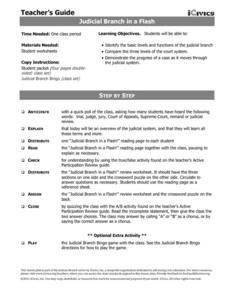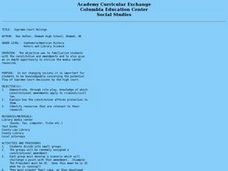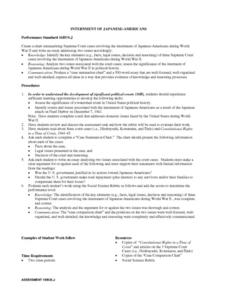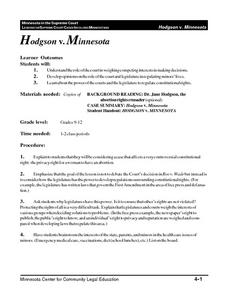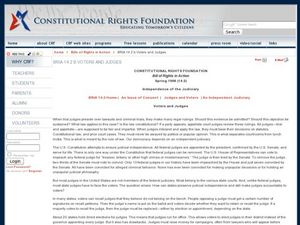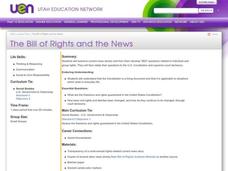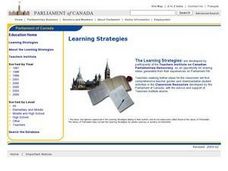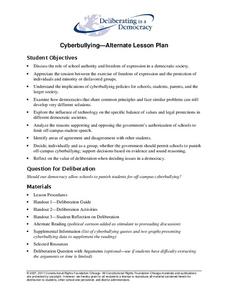iCivics
Judicial Branch in a Flash
What is the difference between the federal court and state court systems? What about criminal versus civil cases? Check out this resource that will offer your class members a general and effective overview of the judicial branch in the...
Judicial Learning Center
Article III WebQuest
Why is Article III of the constitution so significant? Pupils discover the importance of Article III and how it relates to past as well as current events by completing Internet research using a provided handout. They learn everything...
Curated OER
Branches of Government
After reading a short text on the branches of government in the United States, future voters answer 8 fill-in-the-blank questions, as well as 11 true or false questions. This instructional activity would be a great homework assignment or...
Curated OER
Supreme Court Rulings
Become familiar with the constitution and amendments with an in depth opportunity to utilize media center resources. Groups of students focus on an amendment then make a presentation to the class.
Curated OER
Marbury v. Madison (1803)
Students examine federalism and judicial review. In this Supreme Court lesson, students examine primary documents from Marbury v. Madison and discuss the implications of the decision.
Heritage Foundation
Procedural Amendments: Amendments III, IV, and V
So many US Constitution clauses, so little time. The 17th installment in a 20-part series teaches pupils about the Third, Fourth, and Fifth Amendments. Learning through activities such as group work, connecting to current events, and...
Newseum
Introduction to the First Amendment: What’s a Violation?
Young historians take an in-depth look at the five freedoms granted by the First Amendment. Groups apply their knowledge of the freedoms to a series of scenarios to decide if the depicted actions represent a violation of the amendment.
Judicial Learning Center
Judicial Independence
Most people support the idea of an independent judiciary in theory until they hear about a court case that violates their principles. An informative resource explains why the concept is important. It also provides scholars of criminology...
Curated OER
Internment of Japanese-Americans
Students assess the significance of a watershed event in the political history of the United States . They identify events and issues associated with the internment of Japanese-Americans as a result of the Japanese attack on Pearl Harbor...
Curated OER
Hodgson v. Minnesota
Students investigate the role of and develop opinions of the court in weighing competing interests in making decisions. They examine the power of the courts and legislature to regulate constitutional rights.
Curated OER
When Court Cases Get Appealed
Learners read and analyze two functional documents. They predict outcomes using prior knowledge and documents. Students draw conclusions about how court cases are appealed. They list the parts of a court case.
Curated OER
Voters and Judges
Students analyze the work on independent judiciaries. In this federal courts lesson, students listen to their instructor lecture on details of federal cases. Students respond to discussion questions and participate in an activity...
EngageNY
Studying Conflicting Interpretations: Perspectives on Plessy v. Ferguson: Part 3
Scholars closely read Justice John Marshall Harlan's dissenting opinion in the Plessy v. Ferguson case, seeking to understand why he disagreed with the court's decision that racial segregation laws for public spaces were constitutional....
Curated OER
Branches of Government Worksheet 2
Looking for a quick assessment to give to your class about the branches of government in the United States? This is a multiple choice activity that could be used as a quiz. There are 9 questions, some of which are a bit dated and should...
Curated OER
Branches of Government Worksheet
This is a basic multiple choice activity. Learners answer a set of 9 multiple choice questions about early colonists and branches of government. You might use this as a check for understanding or a quick quiz. The first 2 questions are...
Curated OER
Supreme Court: Practice with Precedents 2010
Eleventh graders examine the term precedent in the court system. In this American Government lesson, 11th graders research various court cases in history. Students create a study chart that shows comparisons of these cases.
Curated OER
Making an Appeal
Students make an appeal. In this making an appeal lesson plan students give characteristics of the Washington Supreme Court. Students examine public policy conflicts and present an appellate case.
Curated OER
Michigan United Conservationists Club (M.U.C.C). v. Michigan Secretary of State: An Issue of Referendum
Students observe the procedures of the Michigan Supreme Court. They identify the processes and procedures being used. They debate a case that was presented to the Court and analyze the oral arguments of the case.
Curated OER
Faces of the Bench
Learners use primary source documents to gather information on justices in the Michigan Supreme Court. They write about the thoughts and experiences of the author. They identify and describe each justice briefly.
Curated OER
Michigan Judicial System Conclusion
Students identify the courts that make up Michigan's judicial system. They state the responsibilities of each court and diagram a flow chart of how a case moves to the Michigan Supreme Court. They participate in a quiz about the current...
Curated OER
The Bill of Rights and the News
Learners examine current news stories and from them develop "BIG" questions related to individual and group rights. They then relate their questions to the U.S. Constitution and supreme court decisions.
Curated OER
Vocabulary Related to the Attire, Accessories and Décor of the Parliament of Canada
Students become knowledgable about the attire, traditions, and protocols of the Senate and Supreme Court by doing research.
Project Tahoe
Individual Rights vs. The Greater Good Within the Scope of War
When, if ever, is the government justified in restricting individual rights? When, if ever, should the "greater good" trump individual rights? To prepare to discuss this hot-button topic, class members examine primary source documents,...
Deliberating in a Democracy
Cyberbullying—Alternate Lesson Plan
Should schools be permitted to punish young scholars for off-campus cyberbullying? After reading a passage that details statistics about cyberbullying and Supreme Court rulings about schools' ability to limit student speech, class...
Other popular searches
- Supreme Court Cases
- Supreme Court Case Studies
- Supreme Court Justices
- The Supreme Court
- Landmark Supreme Court Cases
- Supreme Court Decisions
- Supreme Court Rulings
- Corporations Supreme Court
- Writing Lesson Supreme Court
- Michigan Supreme Court
- Supreme Court Nominations
- Famous Supreme Court Cases


